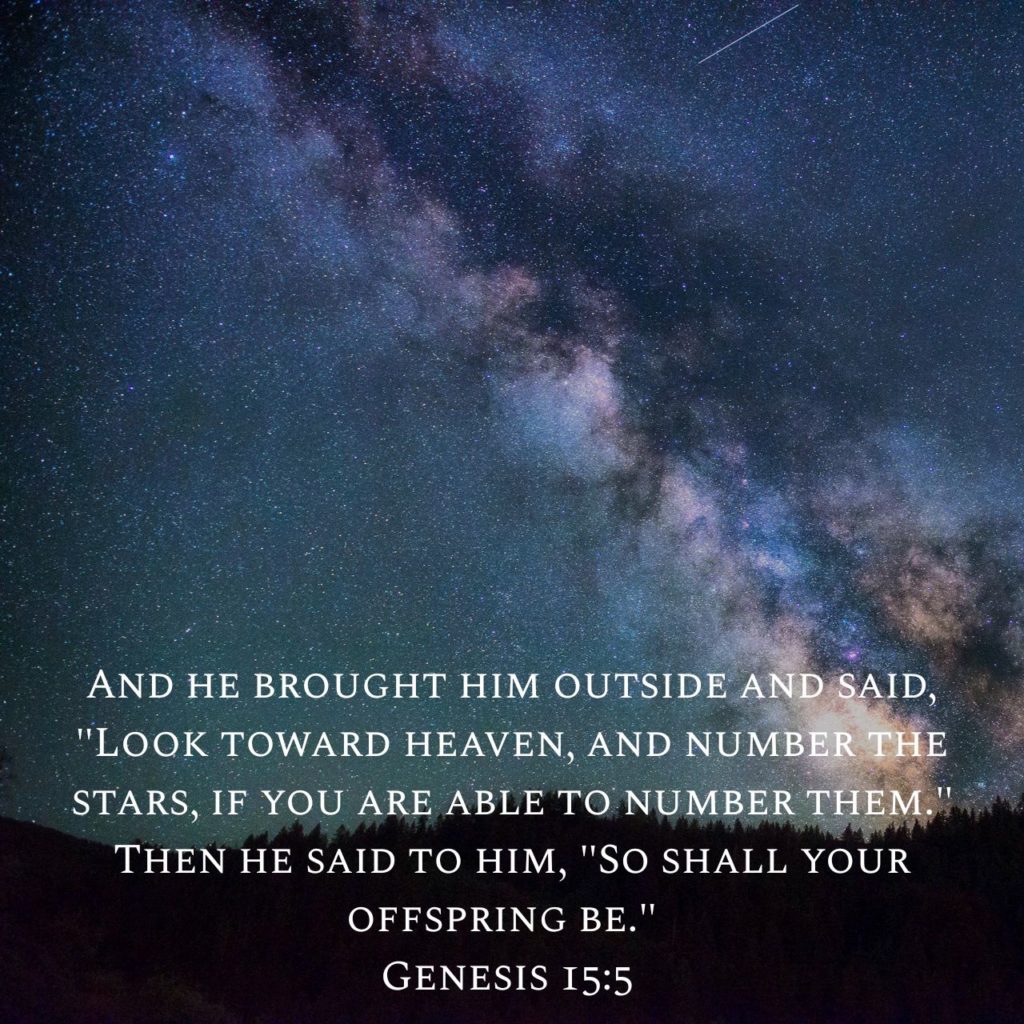
1 After these things the word of the LORD came to Abram in a vision: “Fear not, Abram, I am your shield; your reward shall be very great.”
After the success in defeating Chedorlaomer and rescuing the people of Sodom, Abram had made deals with kings, and was celebrated publicly. Now he has returned to his home, and God speaks to him. God says that he is Abram’s shield, a protector, echoing the words of Melchizedek, who gave God the glory for Abram’s success in the battle.
God also speaks of reward. Abram had previously turned down the plunder and returned it to the king of Sodom, in essence rejecting a reward, in order to keep his integrity. God is promising to reward him for his faith and integrity.
2 But Abram said, “O Lord GOD, what will you give me, for I continue childless, and the heir of my house is Eliezer of Damascus?” 3 And Abram said, “Behold, you have given me no offspring, and a member of my household will be my heir.”
Unlike in the past, where God spoke and Abram responded with worship and sacrifice, Abram now replies vocally to God expressing his frustration in remaining childless.
It is possible that Abram was always intending that Lot inherit his wealth. But after rescuing Lot after the battle of the nine kings, Lot has returned to Sodom, instead of staying with Abram. With Lot back in Sodom, Abram has no relative to be his heir. Eliezer of Damascus, an Assyrian (one of the nations Abram just fought against) is his best servant, and, as is customary in those days, set to inherit Abram’s wealth, but he is a foreigner. Abram knows that God promised that he would become a nation, implying that he would have biological descendants.
4 And behold, the word of the LORD came to him: “This man shall not be your heir; your very own son shall be your heir.” 5 And he brought him outside and said, “Look toward heaven, and number the stars, if you are able to number them.” Then he said to him, “So shall your offspring be.”
God takes time to reassure Abram of his promise, specifically saying that Abram’s son will be his heir, and taking Abram out to look at the stars, saying that his offspring will be as countless as the stars, echoing the earlier sentiment of them being as countless as the dust of the earth.
Note that Abram lives in a tent, far outside of any city, in an age before electric lights. There would have been little to no light pollution in the night sky, and far more stars would have been visible than what we generally see today. As such the promise for descendants a numerous as the stars was all the more impressive.
6 And he believed the LORD, and he counted it to him as righteousness.
This simple statement speak volumes. Since the fall of man, there hasn’t been a single person who was completely righteous. Even the likes of Noah, who was blameless in his generation, fell prey to drunkenness. Mankind is in a sinful state, unable to make themselves righteous in God eyes. However, Abram believed God and it was counted to him as righteousness. Abram’s response of faith in God’s promise allowed God to credit righteousness to Abram. This paradigm of faith in God is what will separate the righteous from the unrighteous throughout all the rest of Scripture.
7 And he said to him, “I am the LORD who brought you out from Ur of the Chaldeans to give you this land to possess.”
God tells Abram His name. The word “LORD” appearing in all caps, is often used to replace the name “YHWH,” the personal name of God, this is adapted from the Hebrew pattern of not using God’s name in vain, even in writing (as a side not the phrase “Lord GOD” also is used to say “YHWH God”). While the word “LORD” has appeared several times prior in the text, this is the first record of God telling someone “I am the LORD,” literally translated “I AM the I AM,” which will be repeated to others such as Moses.
God reminds Abram of his promises and how far He has brought him.
8 But he said, “O Lord GOD, how am I to know that I shall possess it?”
At first glance, Abram seems to be questioning God, in stark opposition to the statement of faith earlier. However, this is not the case. In ancient times when dealing with the transference of land and other goods, there was a covenant ceremony that took place, similar to a contractual statement today. God has offered Abram land, Abram is asking for a covenant to ensure that he would receive it.
9 He said to him, “Bring me a heifer three years old, a female goat three years old, a ram three years old, a turtledove, and a young pigeon.”
God agrees to a covenant ceremony with Abram, and asks for a very specific sacrifice. Covenants, unlike contracts, required the shedding of blood.
10 And he brought him all these, cut them in half, and laid each half over against the other. But he did not cut the birds in half. 11 And when birds of prey came down on the carcasses, Abram drove them away.
Abram agrees to the sacrifice God asks for, and prepares it to the best of his ability, and even works to make sure that the carcasses were not disturbed. He wasn’t going to lazily enter into a covenant with God, he was going to put his best effort in.
12 As the sun was going down, a deep sleep fell on Abram. And behold, dreadful and great darkness fell upon him.
Abram is put into a deep sleep by God, similar to when God put Adam to sleep when creating Eve.
God’s presence here is described as darkness, a theme common to the Old Testament, whereas the New Testament describes God’s presence as light. Perhaps it is God trying to shield His glory from people, who in their sinful nature would be destroyed by His goodness. Or perhaps it is the sinfulness of mankind being afraid of the goodness of God, and thus perceive him as something dark and terrifying. Perhaps both.
13 Then the LORD said to Abram, “Know for certain that your offspring will be sojourners in a land that is not theirs and will be servants there, and they will be afflicted for four hundred years. 14 But I will bring judgment on the nation that they serve, and afterward they shall come out with great possessions.
Abram receives a prophecy of what is to come of his descendants, their enslavement and exodus of Egypt.
15 As for you, you shall go to your fathers in peace; you shall be buried in a good old age.
Abram however will be spared from the enslavement, and is promised to live to a good old age, and die in peace. The idea of “returning to your fathers” suggests a basic idea of an afterlife, even though there is little to no understanding of an afterlife throughout the rest of the Old Testament.
16 And they shall come back here in the fourth generation, for the iniquity of the Amorites is not yet complete.”
God promises to Bring Abram’s descendants back, specifically to judge the sins of the Amorites, one of the largest Canaanite groups. Thus God intends to displace a wicked and sinful people group, with His chosen people group.
Through this vision God tells Abram exactly how His descendants will inherit the land, and everything they will go through to inherit it.
17 When the sun had gone down and it was dark, behold, a smoking fire pot and a flaming torch passed between these pieces. 18 On that day the LORD made a covenant with Abram, saying, “To your offspring I give this land, from the river of Egypt to the great river, the river Euphrates, 19 the land of the Kenites, the Kenizzites, the Kadmonites, 20 the Hittites, the Perizzites, the Rephaim, 21 the Amorites, the Canaanites, the Girgashites and the Jebusites.”
Abram is likely wakes up from the vision to see an aspect of God, represented here as a fire pot and a burning torch, pass between the sacrifices he prepared. God is often represented as fire, especially in the Old Testament. The light of the fire provides a contrast to the darkness Abram experienced earlier, allowing him to see just the faintest hints of God’s glory.
God passes through the sacrifices alone, whereas traditionally both parties would pass through. God is taking sole responsibility for the covenant. He promises Abram that his descendants would inherit all the land between Egypt and the Euphrates, land that belongs to both people groups Abram knows well and some that don’t exist as of the time of Abraham.
God places no requirement on Abram or his descendants. It is a one sided covenant.
